“The Two Popes” (2019). Cast: Anthony Hopkins, Jonathan Pryce, Juan Minujin, Luis Gnecco, Cristina Banegas, Achille Brugnini, Sidney Cole, Willie Jonah, Germán de Silva, Lisandro Fiks, Renato Scarpa, Federico Torre, Daniel Di Cocco, Josello Bella. Archive Footage: Pope Benedict XVI, Pope Francis. Director: Fernando Meirelles. Screenplay: Anthony McCarten. Play: Anthony McCarten, The Pope. Web site. Trailer.
Getting to where we’re meant to be in life sometimes takes us down some unusual and unexpected paths. We may stand back and wonder why we’re going in a certain direction when we’re convinced we’re supposed to go another way. But, no matter how seemingly far afield we may wander, we often find we’re on exactly the right course, and the journey is one of our own making, based on our innermost heartfelt sentiments. It’s a process exemplified in the new fact-based historical drama, “The Two Popes.”
With the death of Pope John Paul II in 2005, the College of Cardinals convened to elect a successor. The conclave came at a critical time in the history of the Roman Catholic Church, one whose outcome would play a significant role in the future direction of the institution. Would the Cardinals elect a new pope from the conservative arm of the Church in an effort to preserve its longstanding traditions, policies and practices? Or would they strike out in a new direction, choosing a reformer who would bring the Church into the 21st Century and more in line with a world characterized by ever-changing conditions?
In the end, this schism was clearly reflected in the results. The College elected German Cardinal Joseph Ratzinger (Anthony Hopkins) to become Pope Benedict XVI, a staunch dogmatic conservative determined to preserve the institution’s time-honored conventions, a choice disapproved of by many progressive-minded Catholics who believed their concerns would be ignored (and who not so subtly mistrusted the ascension of a German to the papacy). Meanwhile, the runner-up in the balloting was Cardinal Jorge Bergoglio (Jonathan Pryce), the Archbishop of Buenos Aires, Argentina, a reformer who saw a pressing need for the Church to reconsider the close-minded positions of many of its policies, an effort aimed at stopping the exodus of Catholics (especially young ones) from the institution. But, having lost out on his bid to become John Paul’s successor, the Cardinal discreetly returned to Latin America to carry on his work in his home diocese.
[caption id="attachment_11258" align="aligncenter" width="350"]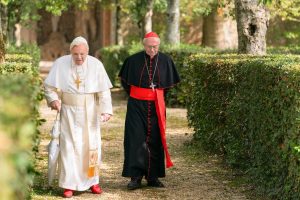 Pope Benedict XVI (Anthony Hopkins, left) and Cardinal Jorge Bergoglio (Jonathan Pryce, right) exchange a series of diverse, sometimes-contentious views about the future of the Church in the new historical drama, “The Two Popes.” Photo by Peter Mountain, courtesy of Netflix.[/caption]
Pope Benedict XVI (Anthony Hopkins, left) and Cardinal Jorge Bergoglio (Jonathan Pryce, right) exchange a series of diverse, sometimes-contentious views about the future of the Church in the new historical drama, “The Two Popes.” Photo by Peter Mountain, courtesy of Netflix.[/caption]
Seven years later, however, Benedict’s reign became embroiled in a series of incendiary incidents that came to be known collectively as the Vatican Leaks Scandals. His ability and willingness to carry on under a microscope of global scrutiny made him quietly but decidedly leery about his future as Pope.
At the same time, a world away, Cardinal Bergoglio began to question his own future, sending a letter to Benedict seeking permission to retire from his position. That inquiry went unanswered for a prolonged period until one day when he was unexpectedly summoned for an audience with the Holy Father. Ironically, he already had a plane ticket for the trip in hand – one that he purchased before receiving the pontiff’s notification.
Meeting at the Palace of Castel Gondolfo, the Pope’s summer residence outside of Rome, Benedict and the Cardinal convened for a series of discussions. The tone was initially contentious, each symbolically reflecting the views that they held regarding the state and future of the Church. And, to confound matters further, Benedict repeatedly refused to address the Cardinal’s retirement request. The cryptic progression of events prompted Bergoglio to wonder why he was asked to come visit in the first place.
In quiet moments together, however, the formal veneer between the two clerics began to drop as each of them spoke about their interests and personal histories. The Pope talked about his musical background and his favorite TV show, among other topics. Meanwhile, the Cardinal spoke about his calling to the Church, citing the time when his younger self (Juan Minujin) broke off his engagement to his fiancée (Cristina Banegas) and joined the Jesuits. Thus began Bergoglio’s odyssey of faith, a journey that took him through a diverse array of religious and secular experiences that brought him to where he was at that moment.
[caption id="attachment_11259" align="aligncenter" width="350"]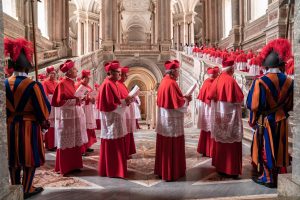 Upon the death of Pope John Paul II in 2005, the College of Cardinals convene for a conclave to select a successor in director Fernando Meirelles’s latest offering, “The Two Popes.” Photo by Peter Mountain, courtesy of Netflix.[/caption]
Upon the death of Pope John Paul II in 2005, the College of Cardinals convene for a conclave to select a successor in director Fernando Meirelles’s latest offering, “The Two Popes.” Photo by Peter Mountain, courtesy of Netflix.[/caption]
Shortly thereafter, with the scope of the scandals widening, Benedict returned to Rome, accompanied by the still-perplexed Cardinal. But, upon their arrival at the Vatican, the Pope’s reasons for wanting to meet with the Cardinal at last became clear – that he was planning to step down from the papacy and wanted Bergoglio to be his successor, something the Holy Father wouldn’t be able to do if he were to grant the Cardinal’s retirement request.
Needless to say, the Cardinal was shocked. The thought of a pope resigning was virtually unheard of; it represented a break in ecclesiastical and administrative continuity that was seen as inconceivable and unacceptable. And the prospect of ascending to the papacy as Benedict’s successor was overwhelming; Bergoglio felt undeserving of the distinction, especially in light of troubling incidents from his past, most notably his perceived collaboration with Argentina’s military junta in its handling of the nation’s political and social “undesirables” (including fellow Jesuits) during the days of the Dirty War from 1976 to 1983. Through flashbacks interspersed with the clerics’ conversations, viewers witness a younger Bergoglio struggle with his conscience over the handling of these events, particularly where safeguarding the well-being of his colleagues Father Franz Jalics (Lisandro Fiks) and Father Orlando Yorio (Germán de Silva) was concerned, a painful episode that resulted in the future Cardinal’s demotion to a parish priest in a remote locale.
However, the more Benedict and Bergoglio conversed, the more revelatory, profound and reflective their discussions became. It also became apparent that they each had a destiny to fulfill and that they were now at the cross-roads of seeing their fates realized. It would not be long before the Cardinal from so far away would be named the first Jesuit pontiff, Pope Francis.
[caption id="attachment_11260" align="aligncenter" width="350"]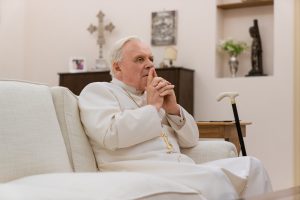 Pope Benedict XVI (Anthony Hopkins) contemplates the radical move of resigning from the papacy in the new, Oscar-nominated drama, “The Two Popes.” Photo by Peter Mountain, courtesy of Netflix.[/caption]
Pope Benedict XVI (Anthony Hopkins) contemplates the radical move of resigning from the papacy in the new, Oscar-nominated drama, “The Two Popes.” Photo by Peter Mountain, courtesy of Netflix.[/caption]
Assuming the role of pope would likely be a daunting task for virtually anyone. It’s an act that carries tremendous responsibilities, not only administratively, but also spiritually. It’s the kind of undertaking that calls for looking deeply within and getting in touch with one’s heart. This frequently calls for making an honest and sincere assessment of one’s innermost intimate beliefs, an ability to take an accurate and comprehensive inventory of these notions as a means for carrying out the duties of the office. And that’s important, for that heartfelt input plays a crucial role in determining the course of events in the Church and, conceivably, in helping to shape the nature of the world at large. Some would call this doing God’s will; others might just as readily say this is an example of the conscious creation process at work, the philosophy that maintains we draw upon these inner intangible resources in manifesting the existence we experience.
There are many examples of this process – and its outcomes – at work in this film. For instance, as becomes apparent early on, Benedict and Bergoglio each become symbolic embodiments of their viewpoints on how they see the Church. Each is a living and breathing personification of their respective outlooks, with Benedict representing the conservative traditionalist and Bergoglio the progressively minded reformer. And those exemplifications (and everything stemming from them) come directly from the beliefs each of them hold.
The clerics’ success at this practice arises from their ability to hear – and listen to – the small, still voice within each of us. Some might call this a search for the word of God, while others might think of this as tuning in to our intuition, a key component in belief formation. Such a distinction is probably more semantic than anything else, given that the results that arise from whatever one calls it are likely the same in each case. This is important, though, considering what can develop from heeding the advice that comes from this practice. For example, when the Cardinal purchased his plane ticket to Rome before receiving the Pope’s summons for a meeting, he wasn’t entirely sure why he was doing so. But his intuitional/divinely inspired hunch proved correct in light of what happened by making the purchase and taking the trip, even if his expectations for the journey didn’t precisely align with the eventual outcome.
[caption id="attachment_11261" align="aligncenter" width="350"]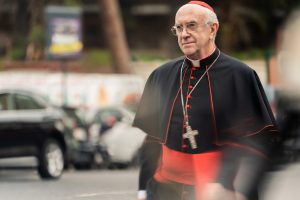 Cardinal Jorge Bergoglio (Jonathan Pryce) considers the daunting possibility of being named a successor to retiring Pope Benedict XVI in the new historical drama, “The Two Popes.” Photo by Peter Mountain, courtesy of Netflix.[/caption]
Cardinal Jorge Bergoglio (Jonathan Pryce) considers the daunting possibility of being named a successor to retiring Pope Benedict XVI in the new historical drama, “The Two Popes.” Photo by Peter Mountain, courtesy of Netflix.[/caption]
Tapping into one’s beliefs also plays a significant role in learning how to balance our inner and outer worlds. As conscious creators know, we draw upon our intangible beliefs to materialize what we experience in our tangible reality, and an acute awareness of this intrinsically connected duality is crucial to those who practice this philosophy, especially anyone engaged in a principally spiritual vocation. By placing excessive emphasis on the inner spiritual realm, we may come to feel less in touch with the physical existence of which we’re just as much a part. While there’s nothing wrong with having a robust spiritual orientation, we must also remember that we’re present in the outer world as well. To that end, ideally we should seek to strike a healthy balance between the two and eschew the temptation to become irretrievably locked into the intangible alone.
As the film illustrates, Benedict often seems so wrapped up in the ecclesiastical life that he loses sight of the real world around him. He’s seen as out of touch and aloof, trying to impose his limited and outmoded worldview on a reality characterized by a greater range of diversity, a narrow outlook that’s kept him from being aware of many of even the most basic aspects of everyday life. The Cardinal, by contrast, has a firm grasp on recognizing the significance of both the spiritual realm from which he draws inspiration and guidance and the physical world in which he dwells. This makes him more pragmatic, more in touch with the commonplace elements of living. He even makes plain his love of such secular pursuits as World Cup soccer and dancing the tango, diversions one may not readily associate with a cleric of his standing. But his ardent attraction to these pastimes illustrates that he’s just as much in the world as he is in his heart.
[caption id="attachment_11262" align="aligncenter" width="350"]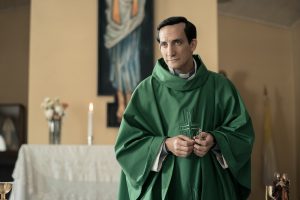 Having been demoted to the position of a parish priest in a remote locale after suspicion of collaborating with Argentina’s military junta during the Dirty War of 1976-83, a young Jorge Bergoglio (Juan Minujin) seeks to find meaning in his calling in “The Two Popes.” Photo by Peter Mountain, courtesy of Netflix.[/caption]
Having been demoted to the position of a parish priest in a remote locale after suspicion of collaborating with Argentina’s military junta during the Dirty War of 1976-83, a young Jorge Bergoglio (Juan Minujin) seeks to find meaning in his calling in “The Two Popes.” Photo by Peter Mountain, courtesy of Netflix.[/caption]
Beliefs also figure significantly into our ability to overcome limitations, as is very much the case with the Cardinal. In many respects, his ascendancy represents a number of firsts: He’s the first Jesuit pope. He’s the first pope from the Americas. And he’s the first pope from the Southern Hemisphere. What’s more, he’s an individual who successfully managed to rise from some of the lowest ranks within the Church to its highest office. And it’s an accomplishment attained by someone who felt unworthy of it, the endorsements and support of others notwithstanding. His experience shows us we can achieve what might seem unthinkable, an inspiring attainment we can all draw from.
As the foregoing shows, using beliefs to satisfy worldly goals is obviously important, but drawing upon them to fulfill intangible objectives is just as significant and attainable, even if the prospect seems less likely. For example, both Benedict and the Cardinal have issues regarding a desire for redemption and forgiveness, something that they each long for but that they both believe may be out of their grasp. However, as conscious creators are aware, beliefs can be used to achieve anything, tangibility considerations aside. When we’re firmly rooted in our beliefs – and have the faith to see them realized – there’s no telling what wishes we can see come true. “Ask and ye shall receive,” it would seem, is a notion not limited to religious texts.
The lives of Benedict and Bergoglio indeed illustrate a rich and fulfilling metaphysical experience, and, from a conscious creation standpoint, they epitomize one of the philosophy’s cornerstone concepts – that everything is in a constant state of becoming. This is especially true for the Cardinal, as seen by his life path. As an individual who sacrificed much to earnestly pursue his faith (and endured numerous hardships along the way), he managed to overcome setbacks and ascend to the highest office of the Church. Bergoglio’s life clearly demonstrates this metaphysical evolution at work, something that ever steers him toward his destiny and that can even occur with stunning speed (such as when he went to Rome to resign and ended up becoming the heir apparent to the papacy). What a remarkable existence indeed.
[caption id="attachment_11263" align="aligncenter" width="350"]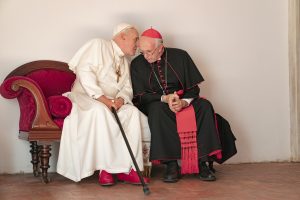 At the cross-roads of their respective destinies, Pope Benedict XVI (Anthony Hopkins, left) and Cardinal Jorge Bergoglio (Jonathan Pryce, right) discuss their future roles in the Church in the new historical drama, “The Two Popes.” Photo by Peter Mountain, courtesy of Netflix.[/caption]
At the cross-roads of their respective destinies, Pope Benedict XVI (Anthony Hopkins, left) and Cardinal Jorge Bergoglio (Jonathan Pryce, right) discuss their future roles in the Church in the new historical drama, “The Two Popes.” Photo by Peter Mountain, courtesy of Netflix.[/caption]
This modestly engaging look at the sometimes-contentious, sometimes-brotherly relationship of Pope Benedict XVI and the future Pope Francis details how this highly unusual transition came into being (and why), particularly from the standpoint of the personal motivations involved. However, while this insightful offering (both in philosophical and historic terms) features fine performances by Hopkins and Pryce, as well as a number of thoughtful dialogues about faith, tradition and the future of the Church, the picture’s sometimes-uneven pacing and occasionally wooden, somewhat stagey exchanges tend to bog down the flow of the narrative despite the best efforts of its two leads to conceal these shortcomings. This is by no means a bad film, but it doesn’t always live up to the hyped praise it’s received, either. The picture, which played briefly at a number of film festivals last fall, is now available for online streaming.
The praise that the film has earned has been accompanied by a number of awards season accolades, most notably three Oscar nominations for the performances of Hopkins and Pryce, as well as for its adapted screenplay. The picture duplicated these honors in the BAFTA Awards contest, with additional nods for best casting and best British film. And, in earlier competitions, this release received two Critics Choice Award nominations for the performances of Hopkins and Pryce and four Golden Globe Award nods for best dramatic picture, best screenplay and the portrayals of the two popes.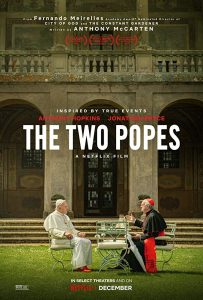
It's been said “The Lord works in mysterious ways.” Those at the pinnacle of the religious hierarchy clearly understand this. But it’s also true for conscious creators who implicitly place their trust in our divine collaborator, the one who works Its magic to help us transform our intentions into realized dreams (even if It doesn’t necessarily take the route we think It should). What ultimately matters, though, is that we arrive where we’re meant to be, ever evolving to fulfill our wishes and our destiny and, one would hope, to create a better world for us all.
Copyright © 2020, by Brent Marchant. All rights reserved.
Tuesday, January 28, 2020
‘The Two Popes’ explores the evolution of one’s destiny
Subscribe to:
Post Comments (Atom)

No comments:
Post a Comment